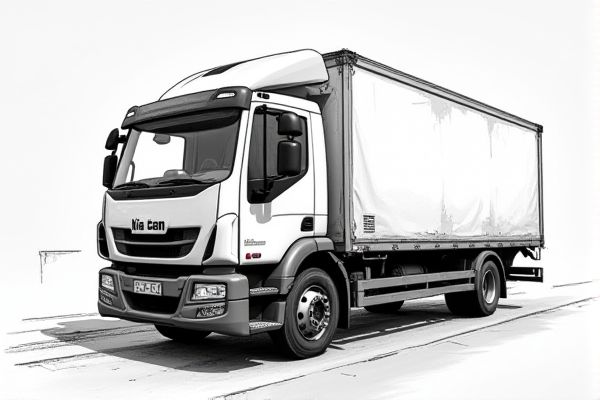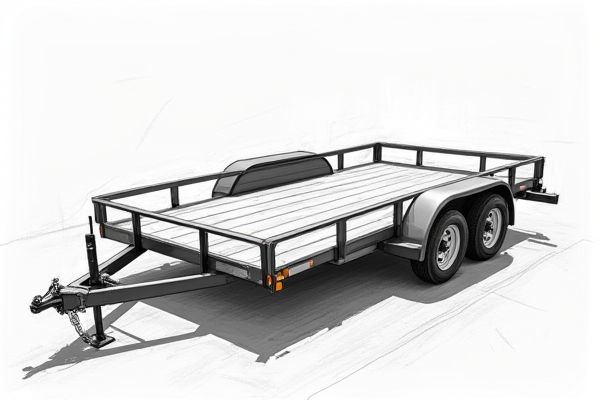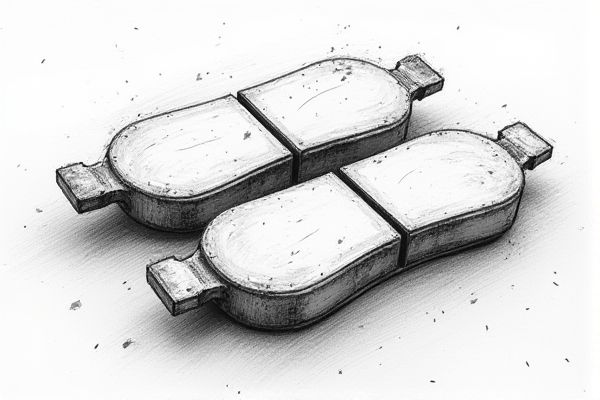In recent years, interest in kei trucks, compact utility vehicles primarily used in Japan, has surged among automotive enthusiasts worldwide. These small, yet versatile vehicles are celebrated for their efficiency, practicality, and unique charm, making them a popular choice for both urban and rural settings. Whether you're looking for a reliable workhorse or a quirky addition to your vehicle collection, there are several brands that stand out in the kei truck category. Join us below as we explore some of the top kei truck brands that have captured the hearts of drivers everywhere.

Illustration of kei truck
Best brands of kei truck in 2025
Suzuki
Suzuki is renowned as one of the top producers of kei trucks, known for their reliability and versatility. In 2024, Suzuki aims to have at least 30% of its global sales come from hybrid and electric vehicles, showcasing its commitment to innovation. The Suzuki Carry, a popular kei truck model, has gone through multiple generations, enhancing its performance and features over the years. Suzuki's market share in the compact car segment in India was approximately 50% in 2023, highlighting its strong market presence. With its robust 660cc four-cylinder engines and effective superchargers, Suzuki kei trucks are highly regarded for their performance and durability. For more insights on exporting kei trucks from Japan, visit Japan Car Direct's guide on the best kei truck to export.
Daihatsu
Daihatsu is a leading producer of kei trucks, with a legacy spanning over six decades since the introduction of the Hijet in 1960. The brand has sold over 7.5 million Hijet units, making it a staple in Japan's mini commercial vehicle market. In 2022, Daihatsu held nearly 30% of the kei car market share, selling almost 349,000 units. The Hijet series, including the Hijet Cargo and Atrai, has been redesigned to incorporate advanced features such as the Daihatsu New Global Architecture (DNGA) and the latest Smart Assist safety system. This redesign has enhanced fuel efficiency, quiet performance, and safety, solidifying Daihatsu's position as a top producer of kei trucks.
Honda
Honda is a leading producer of kei trucks in Japan, known for its popular models such as the Honda N-Box, which was the best-selling kei car in 2022 with 202,200 units sold, a 7% increase from the previous year. In 2022, Honda sold 263,200 kei cars, representing a market share increase of 1% from 2021. Kei cars, including those from Honda, account for over one-third of domestic new-car sales in Japan. The Honda N-Box's success underscores Honda's strong presence in the kei car segment, which is dominated by Japanese brands. Honda's kei cars are designed to meet the strict regulations of the kei car category, including a maximum length of 3.4 meters, width of 1.48 meters, and engine displacement of 660cc.
Subaru
Subaru is renowned for its exceptional kei trucks, particularly the Subaru Sambar, which stands out for its robust 4WD system and practical off-road usability. The Sambar's low gearing and easy 2WD/4WD switch make it a formidable competitor to other off-road vehicles like the Jimny. Introduced in various models, including the 1987 2-cylinder version with a 550cc EK23 engine, the Sambar has consistently delivered good power and balance. Despite its small engine, it produces 28ps at 5,500 rpm and 42Nm of torque at 3,500 rpm. Subaru's kei trucks have gained a loyal following for their reliability and performance. For a deeper dive into the remarkable features of the Sambar, you can explore this comprehensive review.
Mitsubishi
Mitsubishi, as part of the Mitsubishi Motors Corporation, has a significant presence in the Japanese automotive market, including the production of kei trucks. In 2022, Mitsubishi's sales in Japan saw a 16.6% increase, with the company selling 90,555 units, highlighting its growing market share. Mitsubishi's kei trucks, such as those rebadged from Suzuki, contribute to this success, although specific kei truck sales figures are not detailed. The company's involvement in the kei car and truck market is part of its broader strategy to maintain a strong domestic presence. Mitsubishi's partnership with other brands, like Suzuki, also enhances its offerings in the kei vehicle segment. You can find more detailed sales figures on automotive sales in Japan by month.
Nissan
Nissan, though not the leading brand in Kei cars, has made significant strides in the Japanese market with its innovative offerings. In 2022, Nissan sold 142,646 Kei cars, maintaining flat sales compared to the previous year. The launch of the Nissan Sakura, Japan's first all-electric Kei car, marked a new era for the brand in this segment, with nearly 21,900 units sold in its first year. While Nissan's market share in Kei cars is smaller compared to leaders like Daihatsu and Suzuki, the brand's entry into the electric Kei car market is a notable development. Nissan's presence in the Kei car market highlights its commitment to diverse and sustainable vehicle options.
Mazda
Mazda, although not a leading producer of kei cars, does participate in the kei car market by selling rebadged Suzuki models. In the broader context of Japanese automotive sales, Mazda's overall market share is significant, with their vehicles accounting for around 3.6% of the market in 2024. However, in the kei car segment, Mazda's presence is indirect, as they rely on Suzuki's models. Despite this, Mazda's contribution to the Japanese automotive market is substantial, with their sales figures reflecting their popularity, such as selling 96,248 units in the first eleven months of 2024. The kei car market itself remains robust, with these vehicles making up over one-third of new passenger car sales in Japan, a trend that has continued since the 1960s. For more detailed statistics on automotive sales in Japan by month, you can visit the relevant website.
Toyota
Toyota, although not the leading brand in Kei cars, still holds a significant presence in the Japanese automotive market, particularly in other vehicle categories. In November 2024, Toyota dominated the overall Japanese automotive sales with a 51.1% market share, though its Kei car segment is not as prominent. However, Toyota's sister brand, Daihatsu, is a major player in the Kei car market, selling nearly 349,000 Kei cars in 2022, which accounts for almost 30% of the Kei car market share. Toyota itself had a notable decline in its Kei truck sales, with a 63.8% drop in November 2024 compared to the previous year. Despite this, Toyota remains a key player in the broader Japanese automotive industry. For more detailed monthly sales data, visit the automotive sales statistics in Japan.
Isuzu
Isuzu has established itself as a leading producer of kei trucks, known for robust performance and reliability. In 2023, Isuzu sold over 134,500 pickup trucks worldwide, cementing its position as one of the top brands in the segment, with only Ford surpassing this figure. In the Asia-Pacific region, Isuzu held a significant market share, maintaining 30% in the light-duty truck segment and 25% in the heavy-duty truck market. The brand's revenue from commercial vehicles globally reached approximately $19 billion in 2023, with a projected growth of 3% in 2024. Isuzu's strong market presence is propelled by its extensive dealer network and rising demand in emerging markets.
Hino
Hino, a renowned brand in the automotive industry, stands out as a leading producer of kei trucks, known for their reliability and performance. In November 2024, Hino's sales in Japan saw a significant increase, with a 20.9% year-over-year growth, highlighting the brand's strong market presence. Hino's kei trucks are popular for their durability and efficiency, making them a favorite among consumers. The brand's commitment to innovation is evident in its participation in automated driving tests, such as those conducted with Toyota using the Sora fuel cell electric bus. With a market share of 23.2% in the Japanese kei truck segment, Hino continues to be a dominant force in this market. For more details on automotive sales trends in Japan, you can visit the MarkLines Automotive Sales Statistics page.
















Leave a Reply
Your email address will not be published.